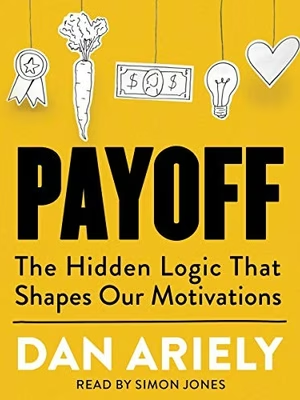Overview
We tend to think motivation is a simple equation: if you pay people more, they will work harder. In Payoff, Dan Ariely proves this is often wrong. He shows that motivation is a tangled mix of connection, meaning, challenge, and ownership. Sometimes, giving someone a cash bonus actually lowers their performance, while a simple "thank you" or a slice of pizza boosts it.
I like this book because it is short, punchy, and based on real-world experiments. Ariely explains that we are not just rats in a maze looking for cheese. We are creators who need to feel that our effort counts for something. Whether you manage a team or just want to motivate yourself to finish a project, this book explains the invisible forces that keep us going.
My Take: The "Sisyphus Check"
One of the most powerful stories in the book is about Sisyphus, the Greek figure condemned to roll a rock up a hill only to watch it roll back down, forever. It is the ultimate example of futile work. My unique takeaway from this book is something I call the "Sisyphus Check."
When I look at my work, or when I assign tasks to others, I ask: "Am I rolling a rock just to watch it fall?" Am I doing work that will be immediately deleted or ignored? If I am a manager, am I ignoring the emails my team sends me? Ariely shows that when we ignore someone's output, we kill their joy. I use this lens to make sure I always acknowledge effort, even a simple "I got this, thanks" prevents people from feeling like Sisyphus.
Key Takeaways
Meaning Beats Happiness
We often think we want to sit on a beach and do nothing, but that doesn't actually make us happy long-term. Ariely points out that the things that give us the most pride, like running a marathon, writing a book, or raising kids, are often painful and difficult. We are motivated by the challenge and the meaning, not just by comfort.
The IKEA Effect
We tend to overvalue things we create ourselves. Ariely calls this the IKEA Effect. When we struggle to build a crooked bookshelf, we love it more than a perfect one we bought pre-assembled. If you want people to care about a project, let them sweat over it a little. Don't do all the work for them.
Acknowledgment is Fuel
Ignoring someone's work is almost as bad as shredding it in front of their face. Ariely ran an experiment where people built Lego robots. When the examiner simply looked at the robot and said "uh huh," people kept working. When the examiner ignored the robot or took it apart immediately, people quit much faster. A tiny bit of acknowledgment goes a long way.
Money Can Backfire
In a famous experiment at an Intel factory, Ariely tested three bonuses: cash, a voucher for pizza, or a compliment from the boss. On the first day, Pizza and Compliments beat Cash. Worse, the group that got the cash actually performed worse than the control group later in the week. Money turned the work into a transaction, killing the natural desire to do a good job.
Chapter-by-Chapter Summary
Part 1: The Meaning of Labor
Ariely opens by challenging the idea that we only work for money. He introduces the "Sisyphus" condition using an experiment where participants built Bionicles (Lego robots). For one group, the robots were kept on the desk. For the other, the robots were taken apart immediately before their eyes. The people whose work was destroyed stopped building much sooner, even though the pay was the same. This proves that without a sense of purpose, even small purpose, our motivation collapses.
Part 2: How We Devalue What We Don't Create
This section explores ownership. Ariely discusses the "IKEA Effect" and origami. He asked novices to fold origami. The creators thought their ugly paper cranes were valuable art, while strangers saw them as useless trash. The lesson is that effort creates love. If you want your team to love a strategy, let them help write it. If you force your plan on them, they won't value it.
Part 3: Money vs. Social Norms
Here, Ariely dives into the Intel chip factory experiment. He distinguishes between "Market Norms" (I pay you, you work) and "Social Norms" (we are a team, we help each other). Cash puts people in a market mindset, which is calculating and cold. Pizza or a text message saying "Well done" puts people in a social mindset, making them work harder because they care about the team and the boss.
Part 4: Trust and Connection
The final sections touch on the intangible parts of motivation: trust and mortality. He argues that companies often kill motivation by creating bureaucracy that says "we don't trust you." He ends on a personal note, discussing how a painful injury in his youth gave him a different perspective on what makes life meaningful. Ultimately, motivation is about feeling connected to others and leaving a mark on the world.
Main Concepts
Market Norms vs. Social Norms
One of the most important frameworks in the book is the difference between market exchanges and social exchanges. You can hurt a relationship by mixing them up. For example, if you pay your friend $50 for cooking you dinner, you insult them. You turned a social act into a market transaction. Ariely shows that companies make this mistake all the time.
Market Norms (The Exchange)
- "I do this only because you pay me."
- Focus is on efficiency and calculation.
- Motivation stops exactly when the pay stops.
- Cash bonuses trigger this mindset.
- Performance often drops over time.
Social Norms (The Connection)
- "I do this because I care or I enjoy it."
- Focus is on relationship and goodwill.
- Motivation is fueled by gratitude and pride.
- Gifts (pizza) or praise trigger this mindset.
- Encourages extra effort and loyalty.
The Joy of Difficulty
Ariely points out a paradox: the things that make us happiest in retrospect are often miserable in the moment. Climbing a mountain is cold, exhausting, and dangerous. Yet, people pay thousands of dollars to do it. This tells us that comfort is overrated. To motivate yourself, don't look for the easiest path. Look for the path that offers a sense of overcoming struggle.
How to Apply the Ideas This Week
Motivation isn't just a concept for CEOs; it's something you can influence in your daily life. Here are a few practical ways I apply Ariely’s research. Try these simple actions this week.
- Give a "Social" Reward. Instead of giving cash or a gift card to someone who helped you, write a heartfelt, specific thank-you note or buy them a thoughtful meal. Tap into social norms, not market norms.
- Stop Ignoring Emails. If someone sends you work, acknowledge it. Even a simple "Received, thanks!" validates their effort. Remember, ignoring people is psychologically similar to shredding their work.
- Add a Little Struggle. If you are mentoring someone, don't fix their mistakes for them. Guide them, but let them do the final fix. The "IKEA effect" ensures they will be prouder of the result if they did the hard work.
- Connect the "Why". Before starting a boring task, spend two minutes writing down who this helps. Does this report help your team get funding? Does this chore help your family relax? Find the meaning before you start the motion.
Memorable Quotes
“Ignoring the performance of people is almost as bad as shredding their effort before their eyes.”
“We are motivated by the sense that we are making a difference, that our efforts are not in vain.”
“When we work harder, we fall more in love with what we are doing.”
Who I Think Should Read This Book
- Managers and Team Leaders: If you lead people, you need to know that money is a blunt instrument. This book will teach you the cheaper, more effective power of praise and pizza.
- Parents and Teachers: Understanding the "IKEA effect" helps you realize why kids need to build their own projects and why doing their homework for them actually robs them of joy.
- Creatives and Makers: If you ever feel like your work is pointless, this book validates that feeling and shows you how to reconnect with the meaning behind your craft.
- Volunteers and Non-Profit Workers: Since you don't rely on "Market Norms" (salary), this book explains exactly why you work so hard and how to keep that fire burning.
What Other Readers Are Saying
This is a popular but very short book (it's part of the TED Books series), and opinions reflect that. On Goodreads, Payoff has a rating of roughly 3.7 out of 5 stars. Readers appreciate the storytelling and the specific experiments, but some feel it is too brief and recycles ideas Ariely has shared in his TED talks.
On Amazon, it rates higher, around 4.2 out of 5 stars. Reviewers often call it "insightful" and "easy to digest." Many managers mention buying copies for their whole team to help shift the culture away from just working for bonuses. The common critique is that if you have read Ariely's other books like Predictably Irrational, some of this might feel familiar.
-
Read reviews on Amazon:
Payoff: The Hidden Logic That Shapes Our Motivations on Amazon
* Affiliate link. I earn from qualifying purchases.
- Read reviews on Goodreads: Payoff on Goodreads
Final Thoughts
Payoff changed how I view the "hard" parts of my day. I used to think that an ideal job would be easy, but Ariely convinced me that an easy job is often a boring one. Now, when I'm struggling with a difficult piece of writing or a complex problem, I try to remind myself: "This struggle is what creates the value."
If you feel like your motivation is slipping, don't just ask for a raise. Look at the meaning. Are you getting acknowledgment? Do you feel ownership over the result? This book is a great reminder that we are human beings who need connection and purpose, not just robots who need fuel.
Ready to Find Your Motivation?
If this summary sparked an idea for you, the full book is a quick, enjoyable read full of more stories and experiments. It's short enough to read in a single afternoon but sticks with you for a long time.
Get Payoff on Amazon* Affiliate link. I earn from qualifying purchases.

